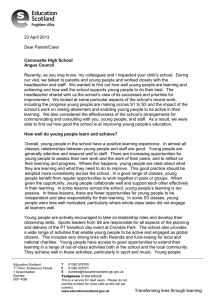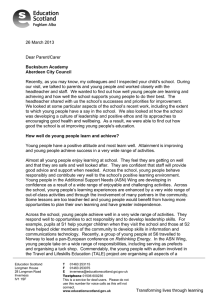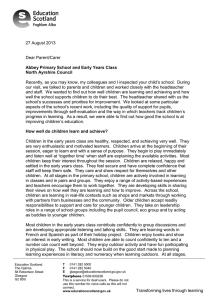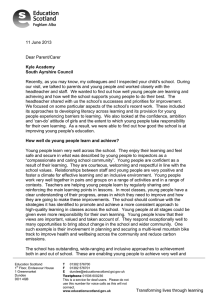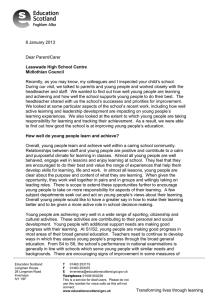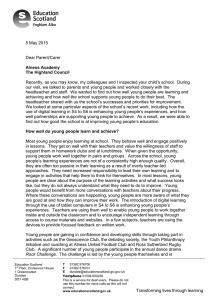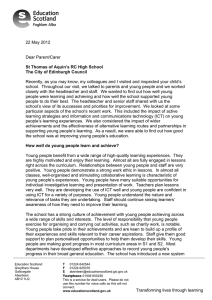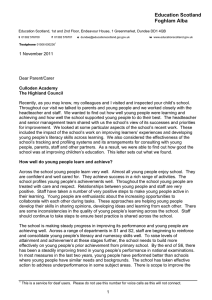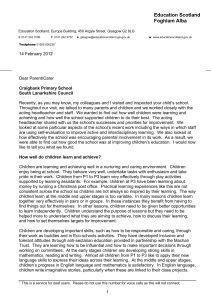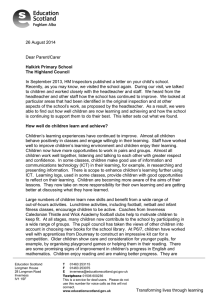23 April 2013 Dear Parent/Carer
advertisement
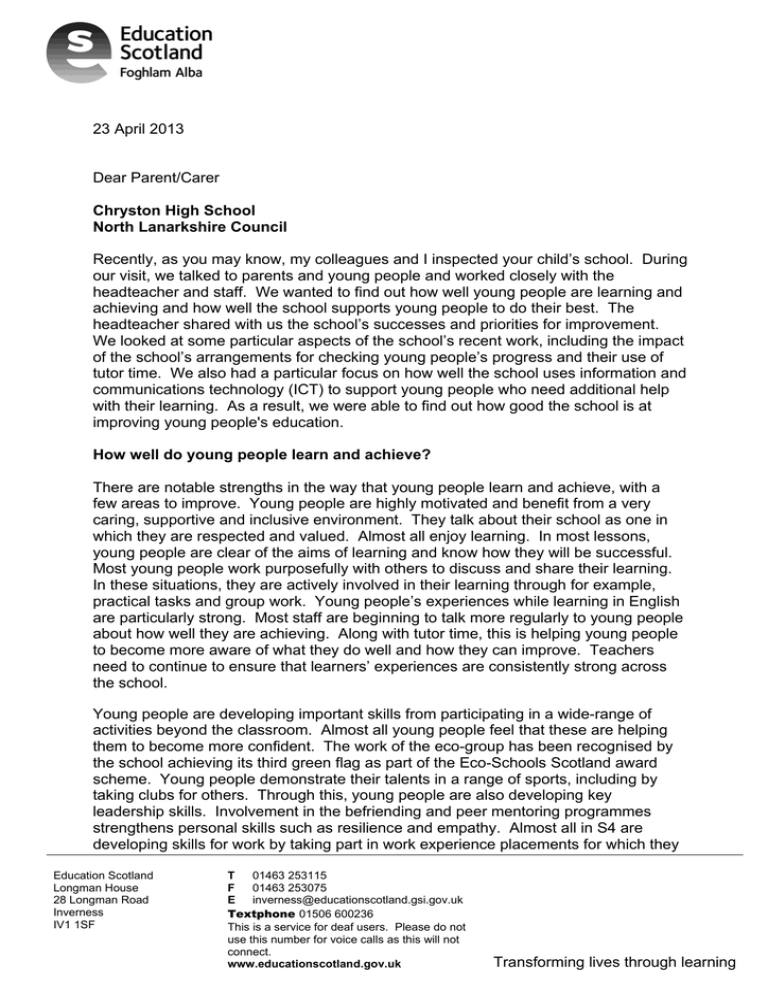
23 April 2013 Dear Parent/Carer Chryston High School North Lanarkshire Council Recently, as you may know, my colleagues and I inspected your child’s school. During our visit, we talked to parents and young people and worked closely with the headteacher and staff. We wanted to find out how well young people are learning and achieving and how well the school supports young people to do their best. The headteacher shared with us the school’s successes and priorities for improvement. We looked at some particular aspects of the school’s recent work, including the impact of the school’s arrangements for checking young people’s progress and their use of tutor time. We also had a particular focus on how well the school uses information and communications technology (ICT) to support young people who need additional help with their learning. As a result, we were able to find out how good the school is at improving young people's education. How well do young people learn and achieve? There are notable strengths in the way that young people learn and achieve, with a few areas to improve. Young people are highly motivated and benefit from a very caring, supportive and inclusive environment. They talk about their school as one in which they are respected and valued. Almost all enjoy learning. In most lessons, young people are clear of the aims of learning and know how they will be successful. Most young people work purposefully with others to discuss and share their learning. In these situations, they are actively involved in their learning through for example, practical tasks and group work. Young people’s experiences while learning in English are particularly strong. Most staff are beginning to talk more regularly to young people about how well they are achieving. Along with tutor time, this is helping young people to become more aware of what they do well and how they can improve. Teachers need to continue to ensure that learners’ experiences are consistently strong across the school. Young people are developing important skills from participating in a wide-range of activities beyond the classroom. Almost all young people feel that these are helping them to become more confident. The work of the eco-group has been recognised by the school achieving its third green flag as part of the Eco-Schools Scotland award scheme. Young people demonstrate their talents in a range of sports, including by taking clubs for others. Through this, young people are also developing key leadership skills. Involvement in the befriending and peer mentoring programmes strengthens personal skills such as resilience and empathy. Almost all in S4 are developing skills for work by taking part in work experience placements for which they Education Scotland Longman House 28 Longman Road Inverness IV1 1SF T 01463 253115 F 01463 253075 E inverness@educationscotland.gsi.gov.uk Textphone 01506 600236 This is a service for deaf users. Please do not use this number for voice calls as this will not connect. www.educationscotland.gov.uk Transforming lives through learning receive national accreditation. The school recognises that they now need to have a clearer picture of how well all young people are developing a full range of skills for learning, life and work. In S1 to S3, young people are progressing well. Overall there needs to be a clearer whole-school approach to capturing young people’s progress in literacy, numeracy and health and wellbeing across learning. From S4 to S6, young people’s achievements in national examinations are largely above or in line with national averages. The school is using an effective range of approaches to improve performance in national examinations. Teachers need to continue to improve attainment in a few subjects and for higher-attaining young people. The number of young people leaving school and progressing onto positive destinations such as employment, education and training continues to be higher than in schools serving young people with similar needs and backgrounds. How well does the school support young people to develop and learn? The school provides quality support to help young people to develop and learn. Across the school, staff know young people very well and use this knowledge to plan learning that is mostly well-paced. Specialist support staff give a very strong lead in supporting young people. There is very effective use of ICT to support young people who need additional help in their learning. This, along with other approaches, is resulting in these young people making very good progress in their learning and achievement. The school has made important links with many partners, including primary schools, businesses and colleges to support young people in planning for their futures. Commendably, a number of staff are actively improving their practice through professional learning on additional support needs. Teachers are increasingly making good use of tutor time to provide helpful support for young people. They now need to be more consistent in giving feedback to learners on their progress. Staff are making good progress in developing the curriculum to reflect the principles and purposes of Curriculum for Excellence. In S1 and S2, approaches such as ‘Picnic in the Park’ are helping young people to make connections across their learning. This also uses national accreditation to recognise young people’s skills in navigation. The programme of ‘S1 Challenges’ provides exciting projects to enable some young people to apply their learning across a range of contexts. The school’s pastoral links with its associated primary schools are an effective basis on which to build further on young people’s prior learning. Staff need to continue to develop the arrangements for providing young people in S3 with a broad general education. From S3 to S6, the school provides a wide-range of subjects and opportunities to prepare young people for employment, education and training. These include programmes being increasingly delivered in partnership, for example the Prince’s Trust xl club. How well does the school improve the quality of its work? The highly effective headteacher is very well regarded by staff, parents and young people. With support from the depute headteachers, she has been very successful in establishing a school where teachers and young people can aspire towards the aim of ‘achieving success for all’. The staff as a team are very committed to improving outcomes for young people. Young people are able to demonstrate very clearly how teachers have changed practice to reflect feedback from them. There are a range of appropriate approaches to self-evaluation in place which are leading to sustained improvement in many areas. These include a detailed process of checking that young 2 people are making sufficient progress. The arrangements for self-evaluation now need to be used in a more focused way to challenge staff to build further on the school’s significant strengths and to secure consistency in practice. The school’s positive relationships with parents and partners need now to be extended to include them more in reviewing key aspects of the school. This inspection of your school found the following key strengths. The leadership of the headteacher. Young people who are proud of their school, courteous and keen to learn. A caring, supportive and inclusive climate for learning and developing. The range of approaches, including ICT, to support those who need additional help with their learning. Staff’s commitment to developing the curriculum. We discussed with staff and the education authority how they might continue to improve the school. This is what we agreed with them. Develop further young people’s responsibilities in learning and their awareness of themselves as learners. Continue to develop the curriculum to improve further attainment and achievement. Improve the consistency of learning and teaching through more focused use of approaches to self-evaluation. What happens at the end of the inspection? We are satisfied with the overall quality of provision. We are confident that the school’s self-evaluation processes are leading to improvements. As a result, we will make no further visits in connection with this inspection. The local authority will inform parents about the school’s progress as part of the authority's arrangements for reporting to parents on the quality of its schools. Joan C. Esson HM Inspector Additional inspection evidence, such as details of the quality indicator evaluations, for your school can be found on the Education Scotland website at http://www.educationscotland.gov.uk/inspectionandreview/reports/school/primsec/Chry stonHighNorthLanarkshire.asp. If you would like to receive this letter in a different format, for example, in a translation please contact the administration team on the above telephone number. If you want to give us feedback or make a complaint about our work, please contact us by telephone on 0141 282 5000, or e-mail: complaints@educationscotland.gsi.gov.uk or write to us addressing your letter to the Complaints Manager, Denholm House, Almondvale Business Park, Livingston EH54 6GA. 3
